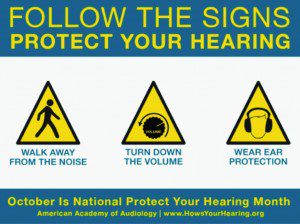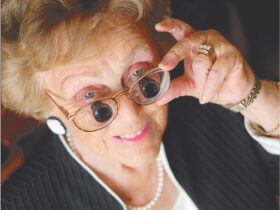 You can permanently lose your hearing from prolonged exposure to noise!
You can permanently lose your hearing from prolonged exposure to noise!
12 million Americans have hearing loss as a result of exposure to noise, noise-induced hearing loss.
Approximately 12% of all children aged 6-19 have noise-induced hearing loss.
This October is National Protect Your Hearing Month. Darlene Ballew, Au.D. and audiologists across the nation are encouraging Americans to protect their hearing by:
. Wearing hearing protection when around sounds louder than 85dB for 30 minutes or more.
. Turning down the volume when listening to the radio, the TV, MP3 player, or anything through ear buds and headphones.
. Walking away from loud noise.
“Noise-induced hearing loss is caused by damage to the microscopic hair cells, or cilia, which are found in the inner ear. Cilia are small sensory cells that convert the sounds we hear (sound energy) into electrical signals that travel to the brain. Once damaged, our hair cells cannot be repaired or grow back, causing permanent hearing loss.” explains Darlene Ballew, Au.D., Doctor of Audiology.
The loudness of sound is measured in units called decibels (dB). Noise-induced hearing loss is caused by prolonged exposure to any loud noise over 85 (dB), such as concerts, sporting events, lawnmowers, fireworks, MP3 players at full volume, and more. A brief exposure to a very intense sound, such as a gun shot near the ear, can also damage your hearing.
An environment is too loud and considered dangerous if you:
. Have to shout over background noise to be heard.
. It is painful to your ears.
. It makes your ears ring during and after exposure.
If you have decreased or “muffled” hearing for several hours after exposure, that is a sign of temporary and possibly permanent hearing damage.
Hearing loss not only affects your ability to understand speech but it also has a negative impact on your social and emotional well-being.
Noise-induced hearing loss can occur gradually over time, and people don’t often realize they are changing the way they live to make up for the change in their hearing. If you suspect you may have a change in your hearing, make an appointment to see an audiologist who will check your hearing to determine if it has changed.
Audiology and Hearing Center of SWL
239-271-2735
www.hearingcareswfl.com










